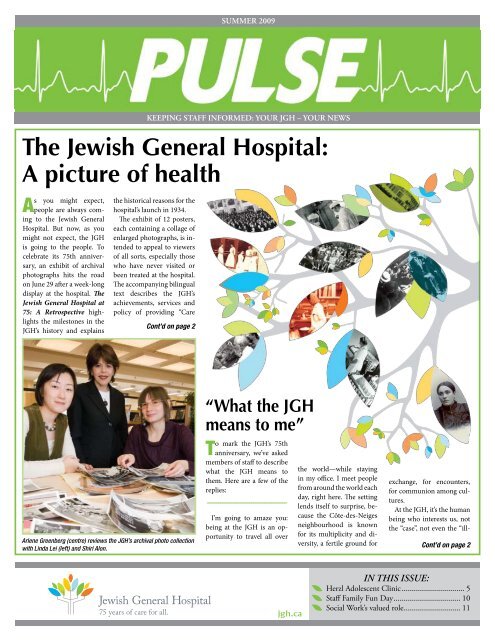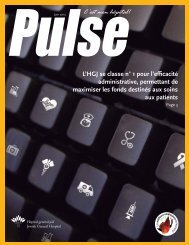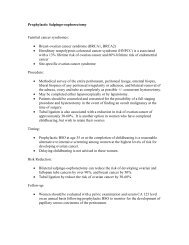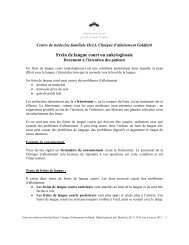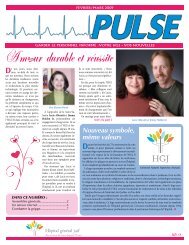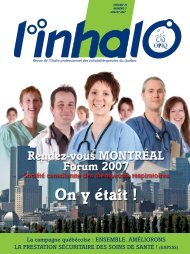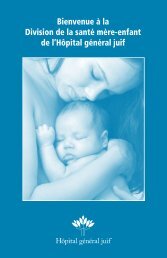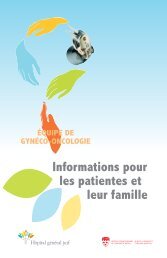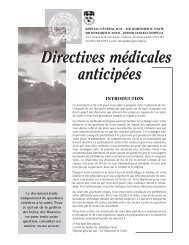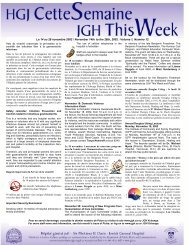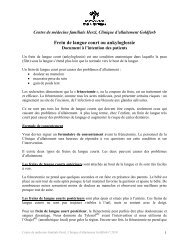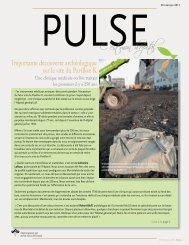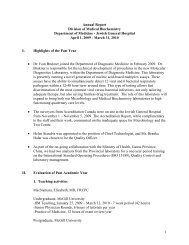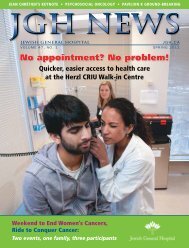The Jewish General Hospital: A picture of health
The Jewish General Hospital: A picture of health
The Jewish General Hospital: A picture of health
Create successful ePaper yourself
Turn your PDF publications into a flip-book with our unique Google optimized e-Paper software.
SUMMER 2009<br />
KEEPING STAFF INFORMED: YOUR JGH – YOUR NEWS<br />
<strong>The</strong> <strong>Jewish</strong> <strong>General</strong> <strong>Hospital</strong>:<br />
A <strong>picture</strong> <strong>of</strong> <strong>health</strong><br />
As you might expect,<br />
people are always coming<br />
to the <strong>Jewish</strong> <strong>General</strong><br />
<strong>Hospital</strong>. But now, as you<br />
might not expect, the JGH<br />
is going to the people. To<br />
celebrate its 75th anniversary,<br />
an exhibit <strong>of</strong> archival<br />
photographs hits the road<br />
on June 29 after a week-long<br />
display at the hospital. <strong>The</strong><br />
<strong>Jewish</strong> <strong>General</strong> <strong>Hospital</strong> at<br />
75: A Retrospective highlights<br />
the milestones in the<br />
JGH’s history and explains<br />
the historical reasons for the<br />
hospital’s launch in 1934.<br />
<strong>The</strong> exhibit <strong>of</strong> 12 posters,<br />
each containing a collage <strong>of</strong><br />
enlarged photographs, is intended<br />
to appeal to viewers<br />
<strong>of</strong> all sorts, especially those<br />
who have never visited or<br />
been treated at the hospital.<br />
<strong>The</strong> accompanying bilingual<br />
text describes the JGH’s<br />
achievements, services and<br />
policy <strong>of</strong> providing “Care<br />
Cont’d on page 2<br />
Arlene Greenberg (centre) reviews the JGH’s archival photo collection<br />
with Linda Lei (left) and Shiri Alon.<br />
“What the JGH<br />
means to me”<br />
To mark the JGH’s 75th<br />
anniversary, we’ve asked<br />
members <strong>of</strong> staff to describe<br />
what the JGH means to<br />
them. Here are a few <strong>of</strong> the<br />
replies:<br />
------------------------------------<br />
I’m going to amaze you:<br />
being at the JGH is an opportunity<br />
to travel all over<br />
jgh.ca<br />
the world—while staying<br />
in my <strong>of</strong>fice. I meet people<br />
from around the world each<br />
day, right here. <strong>The</strong> setting<br />
lends itself to surprise, because<br />
the Côte-des-Neiges<br />
neighbourhood is known<br />
for its multiplicity and diversity,<br />
a fertile ground for<br />
exchange, for encounters,<br />
for communion among cultures.<br />
At the JGH, it’s the human<br />
being who interests us, not<br />
the “case”, not even the “ill-<br />
Cont’d on page 2<br />
IN THIS ISSUE:<br />
Herzl Adolescent Clinic ............................... 5<br />
Staff Family Fun Day ................................. 10<br />
Social Work’s valued role ............................ 11
Continued from page 1<br />
...a <strong>picture</strong> <strong>of</strong> <strong>health</strong>!<br />
for all”, serving patients from all<br />
backgrounds from across Montreal<br />
and throughout Quebec. At the same<br />
time, the exhibit <strong>of</strong>fers a revealing and<br />
<strong>of</strong>ten entertaining peek into the way<br />
medicine was practiced during the<br />
early decades <strong>of</strong> the 20th century.<br />
“During this special anniversary<br />
year, the JGH has looked to its distinguished<br />
past in order to prepare for a<br />
bright future,” says Chief Librarian,<br />
Arlene Greenberg. “This exhibit is<br />
the hospital’s gift and tribute to you—<br />
the patients, staff, benefactors and vol-<br />
“One <strong>of</strong> the most urgent needs <strong>of</strong> our city at the present time is additional<br />
hospital capacity, and your decision to keep the hospital, when built, entirely<br />
free from all racial, religious and sectarian distinctions, shows the<br />
true Montreal spirit <strong>of</strong> mutual race tolerance and inter-racial amity. You<br />
have my fullest endorsation.”<br />
– Montreal mayor, Camillien Houde, in a letter to Allan Bronfman, founding<br />
President <strong>of</strong> the <strong>Jewish</strong> <strong>General</strong> <strong>Hospital</strong>, and Michael Hirsch, first<br />
Vice-President <strong>of</strong> the JGH, August 22, 1929.<br />
Continued from page 1<br />
...what the JGH means<br />
ness”, but the person who lives with it.<br />
<strong>The</strong> hospital takes an overview <strong>of</strong> humanity<br />
through humanization <strong>of</strong> care,<br />
which spans not only doctors, nurses<br />
and technicians, but the heroes we<br />
seldom hear about—the music therapist,<br />
Dr. Clown, the ladies who bring<br />
pets to cheer up patients, the many<br />
volunteers…. <strong>The</strong> JGH is full <strong>of</strong> everyday<br />
heroes, in what I call the “little<br />
village” within the global village. <strong>The</strong><br />
hospital is a daily reminder that we all<br />
inhabit the same world.<br />
Marc Renaud, Eye Clinic<br />
------------------------------------------------<br />
<strong>The</strong> <strong>Jewish</strong> <strong>General</strong> <strong>Hospital</strong> is hope,<br />
faith, and love. Hope is as essential to<br />
life as air and water. You need Hope to<br />
Cope. It comes from having purpose.<br />
At the JGH, people finish their tasks,<br />
fulfill their responsibilities, keep their<br />
promises and complete their commitments.<br />
<strong>The</strong>y make themselves available<br />
to serve. <strong>The</strong>y want to be ready<br />
to jump into service when called on<br />
and they pay attention to needs. <strong>The</strong>y<br />
2 PULSE • SUMMER 2009<br />
unteers who have made the JGH such<br />
a vital element in the life <strong>of</strong> Montreal.”<br />
<strong>The</strong> retrospective is largely chronological,<br />
explains Archives Assistant<br />
Shiri Alon. It traces the hospital’s history<br />
from its medical precursors, such<br />
as the Hebrew Maternity <strong>Hospital</strong> and<br />
the Herzl Dispensary (Canada’s first<br />
<strong>Jewish</strong> clinic) to the “Your Tribute Everlasting”<br />
fundraising campaign. Also<br />
included are the hospital’s groundbreaking<br />
and construction, the founding<br />
<strong>of</strong> the Women’s Auxiliary (now<br />
known as <strong>The</strong> JGH Auxiliary), clinical<br />
perform every task with equal dedication<br />
and “with all their heart.”<br />
Mary Rose Macapuno, Sterilization<br />
Department and Enviro-Services<br />
------------------------------------------------<br />
Thirty-two years ago my husband<br />
was admitted for surgery at the JGH.<br />
He was here for one week and during<br />
this time, I was able to really observe<br />
the functioning <strong>of</strong> the hospital and all<br />
its workers. I decided I wanted to be<br />
part <strong>of</strong> the staff. I applied for a position,<br />
was hired and have been here<br />
ever since. I have never regretted my<br />
decision and am proud <strong>of</strong> being part<br />
<strong>of</strong> the JGH.<br />
Patricia Beck, Administrative technician,<br />
Nursing Resource Centre<br />
------------------------------------------------<br />
Arriving in Canada from post-war<br />
Poland, my parents always felt they<br />
could come to the <strong>Jewish</strong> <strong>General</strong><br />
<strong>Hospital</strong> without fear <strong>of</strong> rejection.<br />
This hospital was built to give people<br />
like them a place where they could feel<br />
Where to see the exhibit<br />
<strong>The</strong> <strong>Jewish</strong> <strong>General</strong> <strong>Hospital</strong> at 75: A Retrospective will travel throughout<br />
Montreal in libraries, a university and even “centre ice” at the old Forum.<br />
If you are interested in planning a group visit to one <strong>of</strong> these locations,<br />
please contact Linda Lei at 514-340-8222, ext. 3277.<br />
June 18 - 26 <strong>Jewish</strong> <strong>General</strong> <strong>Hospital</strong><br />
June 29 - July 24 Pepsi Forum<br />
July 27 - Aug. 21 Westmount Public Library<br />
Aug. 21 - Sept. 4 McGill University’s McLennan Library<br />
Sept. 4 - 25 McGill University’s Osler Library<br />
Sept. 25 - Oct. 16 Gelber Conference Centre, 2 Cummings Square<br />
Oct. 16 - Nov. 13 Eleanor London Côte Saint-Luc Public Library<br />
Nov. 13 - Dec. 18 <strong>Jewish</strong> <strong>General</strong> <strong>Hospital</strong><br />
activities in the early years, the founding<br />
<strong>of</strong> the JGH School <strong>of</strong> Nursing, and<br />
research and clinical initiatives. “<strong>The</strong><br />
exciting aspect in putting this exhibit<br />
together is that the archival materials<br />
come right from the hospital,” says<br />
Ms. Alon. “We did not have to go far<br />
to research the hospital’s past.”<br />
Linda Lei, Archival Consultant,<br />
says, “From the forerunners <strong>of</strong> the<br />
safe and be treated without prejudice.<br />
Throughout its 75 years, it has been<br />
a safe haven <strong>of</strong> caring and comfort,<br />
overseeing the <strong>health</strong> <strong>of</strong> its community.<br />
It is now a centre whose doors<br />
welcome all religions and race, and<br />
whose heritage has remained strong.<br />
I am proud to be a part <strong>of</strong> its keen<br />
knowledge, its ongoing strength and<br />
its warm heart.<br />
Brenda Ajzenkopf, Social Work<br />
------------------------------------------------<br />
<strong>The</strong> JGH makes me feel secure, cared<br />
about, warmly supported, and truly<br />
valued. For 33 years as a nurse, I’ve<br />
encountered many <strong>health</strong>care pr<strong>of</strong>essionals<br />
that portray similar attitudes<br />
and values. In spite <strong>of</strong> large numbers<br />
<strong>of</strong> employees and numerous depart-<br />
JGH in the 1910s to the latest expansion<br />
<strong>of</strong> Radiation Oncology and the<br />
main entrance on Côte-Sainte-Catherine<br />
Road, this collection <strong>of</strong> photographs<br />
is not only a reflection <strong>of</strong> the<br />
close, long-standing bond between<br />
the hospital and its community, but a<br />
look into the bright future. <strong>The</strong> JGH<br />
is proud <strong>of</strong> its legacy because it is a<br />
legacy <strong>of</strong> serving patients.” u<br />
ments, I have always been treated with<br />
respect and have felt a valued member<br />
<strong>of</strong> every team. I tip my hat to you, and<br />
may we have this beautiful relationship<br />
for many more years.<br />
Bonnie Selcer, Transfusion Safety<br />
Nurse<br />
------------------------------------------------<br />
What is it that makes this hospital<br />
more than just a place <strong>of</strong> work? Some<br />
would say it is the staff, who are more<br />
than just staff, they are friends. Some<br />
would say it’s the care given by the<br />
doctors and nurses and all in between,<br />
but it is more than just care: it is caring.<br />
We’re all in this together and nowhere<br />
is that more apparent than here<br />
at the JGH – It’s where life lives.<br />
Nicholas Brand, Admitting Department<br />
u<br />
<strong>The</strong> <strong>Jewish</strong> <strong>General</strong> <strong>Hospital</strong> extends its thanks to the following companies,<br />
which have generously donated prizes for the JGH’s 75th anniversary raffle:<br />
Arbone International, <strong>The</strong> JGH Auxiliary, Costco, Diesel, Dtox, Java U, Max<br />
Mass and Associates, Miss Sixty, More Magazine, NuWave Promotions,<br />
Parasuco, Pelle Salon, Point Zero, Puma, Le Sanctuaire, TD Meloche<br />
Monnex and the YM-YWHA.
All aboard the bed board<br />
All JGH patients are now on<br />
board—the bed board, that is.<br />
Operated by the Admitting Office, the<br />
bed board tracks the use <strong>of</strong> the hospital’s<br />
637 beds, indicating whether each<br />
is occupied, vacant or reserved. This<br />
past spring, it was streamlined when<br />
a computerized version replaced the<br />
manual system that had been in use<br />
for many years.<br />
Once a patient is admitted and assigned<br />
a bed, the electronic board<br />
records that person’s name, date <strong>of</strong><br />
admission, physician or department<br />
(such as Palliative Care), diagnosis<br />
and bed number.<br />
<strong>The</strong> new system lets staff find and<br />
reserve beds more quickly and easily.<br />
In addition to determining the status<br />
<strong>of</strong> beds in their own departments,<br />
nursing directors and unit agents can<br />
tag any bed that will soon be free, so<br />
that Admitting can make plans to assign<br />
it to a new patient.<br />
Several Emergency Department<br />
physicians will also be able to view<br />
the electronic board instead <strong>of</strong> calling<br />
Admitting to ask which beds are free.<br />
This eases patients out <strong>of</strong> Emergency<br />
more quickly and makes room for<br />
new patients. Annie Le Scraigne, an<br />
IT Project Manager who is continually<br />
refining the system, says it enables<br />
“the correct, secure information<br />
to reach the right people at the right<br />
Annie Le Scraigne and Nicholas Brand with the new electronic bed board.<br />
Accreditation process boosts safety<br />
Since improving patient safety is<br />
Accreditation Canada’s ultimate<br />
objective, it uses the accreditation<br />
process to identify unsafe practices<br />
and support the efforts <strong>of</strong> <strong>health</strong>care<br />
organizations to promote safe care.<br />
In addition to establishing standards<br />
that address the challenges related<br />
to patient safety, Accreditation<br />
Canada has developed Patient Safety<br />
Goals and Required Organizational<br />
Practices (ROPs) that are integral to<br />
the accreditation program.<br />
A Required Organizational Practice<br />
is an essential practice that <strong>health</strong>care<br />
organizations must implement<br />
in order to enhance patient safety and<br />
minimize risk. Accreditation Canada<br />
has identified seven Patient Safety Ar-<br />
moment. <strong>The</strong> electronic bed board<br />
helps make the JGH one <strong>of</strong> the most<br />
technologically advanced hospitals in<br />
the province, in terms <strong>of</strong> computing.”<br />
By contrast, the old system consisted<br />
<strong>of</strong> two large wooden panels, with<br />
637 slots (one per bed) divided according<br />
to hospital unit. An occupied<br />
bed was represented by a paper information<br />
card in the appropriate slot.<br />
When the patient was discharged or<br />
eas—culture, communication, medication<br />
use, worklife/workforce, infection<br />
control, fall prevention and risk<br />
assessment—each with its own ROPs,<br />
for a total <strong>of</strong> 31.<br />
A few examples <strong>of</strong> ROPs:<br />
• Establish a reporting system for<br />
Glenn J. Nashen - Director,<br />
Public Affairs and Communications<br />
Laure-Elise Singer - Co-Editor, Pulse<br />
Henry Mietkiewicz - Co-Editor, Pulse<br />
Stephanie Malley - Contributor<br />
transferred to another unit, the card<br />
was thrown away or moved to a new<br />
slot. This made for a slow, cumbersome<br />
process. Having worked with<br />
the manual system for decades, Anna<br />
Abramowicz, former Assistant Chief<br />
<strong>of</strong> Medical Records and Admitting<br />
Services, jokes that “no more gymnastics<br />
are necessary. <strong>The</strong> new system<br />
is more efficient, with less room for<br />
error.” Barbara Streicher, a booking<br />
sentinel (extremely serious) events,<br />
adverse events and near misses, including<br />
appropriate follow-up<br />
• Implement verification processes<br />
and other checking systems for highrisk<br />
activities<br />
• Implement and evaluate a fall pre-<br />
JEWISH GENERAL HOSPITAL • SUMMER 2009<br />
3755 Côte-Sainte-Catherine Road, Room A-106, Montreal, Quebec H3T 1E2<br />
Daniel Nahmias-Léonard - Contributor<br />
Sean Martin - Contributor<br />
Arlette Leveillé - Translation<br />
Latitudes Marketing and Design - Design<br />
JGH Audio Visual Services - Photos<br />
This outdated manual bed board is going<br />
by the boards.<br />
agent in Admitting, enthuses: “After<br />
working with the old boards for 26<br />
years, I’m truly pleased at how easy it<br />
was to adapt to the new system.”<br />
It’s also environmentally friendly,<br />
says Nicholas Brand, a booking agent<br />
in Admitting. “<strong>The</strong> amount <strong>of</strong> paper<br />
this will save, while reducing waste,<br />
demonstrates the JGH’s commitment<br />
to our environment.” u<br />
vention strategy to minimize the impact<br />
<strong>of</strong> client falls<br />
For more information, visit accreditation-canada.ca<br />
or contact Jocelyne<br />
Pepin at extension 5925. u<br />
– Jocelyne Pépin, 2009 Accreditation<br />
Coordinator<br />
jgh.ca<br />
Les Emballages Colorama - Printer<br />
Please e-mail submissions to:<br />
communications@jgh.mcgill.ca<br />
or call local 4120. Room: A-106<br />
For information about advertising in Pulse, please consult JGH.ca or call 514-340-8222, ext. 5818. We apologize in advance for any<br />
errors, misspellings or omissions. Please note that to our knowledge at press time, all information in this publication was accurate.<br />
PULSE • SUMMER 2009 3
Names in the news....<br />
Welcome<br />
Rosemary Steinberg<br />
Rosemary Steinberg has joined the<br />
<strong>Jewish</strong> <strong>General</strong> <strong>Hospital</strong> as Local<br />
Commissioner <strong>of</strong> Complaints and<br />
Quality <strong>of</strong> Services. In this role, Ms.<br />
Steinberg assists patients and their<br />
families, using the complaint process<br />
not only to mediate in various<br />
situations, but to identify areas where<br />
hospital services can be improved. “I<br />
ask myself three basic questions,” she<br />
says. “Could or should anything else<br />
have been done in a particular situation?<br />
Could anything have been done<br />
better? Is there anything we can learn<br />
from this situation?” A social worker<br />
by training, Ms. Steinberg has extensive<br />
experience as a clinical social<br />
worker, a manager and a Complaints<br />
Commissioner, including 15 years at<br />
the Ville Marie Social Service Centres.<br />
Mario Beaulieu<br />
As the JGH’s new industrial hygienist,<br />
Mario Beaulieu is identifying potential<br />
workplace hazards and developing<br />
ways <strong>of</strong> improving safety in the hospital<br />
and in the Lady Davis Institute for<br />
Medical Research. Mr. Beaulieu will<br />
also study working conditions from<br />
an occupational <strong>health</strong> and safety<br />
perspective, while assessing possible<br />
physical, chemical and biological<br />
hazards. In addition, he will develop,<br />
design and update programs relating<br />
to the identification, evaluation and<br />
monitoring <strong>of</strong> the workplace environment.<br />
Mr. Beaulieu has more than 10<br />
years <strong>of</strong> experience in risk management,<br />
planning and the implemen-<br />
4 PULSE • SUMMER 2009<br />
tation <strong>of</strong> institutional and industrial<br />
hygiene prevention programs in the<br />
<strong>health</strong>care sector.<br />
Appointments<br />
Dr. Howard Bergman<br />
Dr. Howard Bergman stepped down<br />
in April as JGH Chief <strong>of</strong> Geriatric<br />
Medicine to accept an appointment<br />
as Vice-President and Scientific Director<br />
<strong>of</strong> the Quebec Fund for Health<br />
Research. However, Dr. Bergman,<br />
Chief <strong>of</strong> the Division since 1991, will<br />
remain a member <strong>of</strong> the JGH medical<br />
staff and an investigator at the JGHbased<br />
Solidage Research Group on<br />
services for the elderly. In addition,<br />
he will stay on at McGill University as<br />
the Dr. Joseph Kaufmann Pr<strong>of</strong>essor in<br />
Geriatric Medicine, and as Pr<strong>of</strong>essor<br />
in McGill’s Departments <strong>of</strong> Medicine,<br />
Family Medicine and Oncology. In<br />
his new position, Dr. Bergman will<br />
play a key role in enabling the Quebec<br />
Fund for Health Research to provide<br />
funding for research, contribute to<br />
training, and establish partnerships<br />
related to research and innovation in<br />
Quebec.<br />
Lyne St-Louis<br />
Lyne St-Louis, a Clinical Nurse Specialist<br />
in the Intensive Care Unit, has<br />
been appointed for a six-year term to<br />
the Critical Care Nursing Certification<br />
Examination Committee <strong>of</strong> the<br />
Canadian Nurses Association (CNA).<br />
Ms. St-Louis, one <strong>of</strong> only eight people<br />
chosen from across Canada, will serve<br />
as a representative <strong>of</strong> the Central Region.<br />
Among her tasks is to assist her<br />
peers in reviewing the final nursing<br />
specialty examination, setting the<br />
pass mark and recommending final<br />
approval <strong>of</strong> the examination to CNA.<br />
She will also act as a CNA ambassador<br />
by promoting certification at pr<strong>of</strong>essional<br />
development activities.<br />
Congratulations<br />
Joyce Arsenault<br />
Joyce Arsenault, a nurse, certified<br />
diabetes educator in the Division<br />
<strong>of</strong> Endocrinology and member <strong>of</strong><br />
Team Diabetes Canada, participated<br />
in the 113th Boston Marathon on<br />
April 20, finishing in four hours and<br />
10 minutes. This is the “holy grail”<br />
<strong>of</strong> marathons, a hilly, challenging<br />
42.2-kilometre course. Ms. Arsenault<br />
was among 25,000 runners from 60<br />
countries.<br />
Louise de Bellefeuille<br />
A hearty “well done” to Louise de<br />
Bellefeuille, Head Nurse on 4East<br />
(Psychiatry), who was awarded the<br />
2009 Laureate in the Florence Prize<br />
in the Health Promotion category by<br />
the Order <strong>of</strong> Nurses <strong>of</strong> Quebec. Ms.<br />
de Bellefeuille received the award for<br />
having “dedicated herself wholeheartedly<br />
to the cause <strong>of</strong> mental <strong>health</strong>, to<br />
meet the needs <strong>of</strong> the patients and<br />
families affected, to improve their<br />
quality <strong>of</strong> life, and wipe away the prejudices<br />
associated with mental illness.<br />
Her leadership and determination<br />
have led her to actively participate in<br />
many committees and develop a range<br />
<strong>of</strong> programs and services, to improve<br />
the quality <strong>of</strong> care for patients suffering<br />
from mental illness.”<br />
Brahms E. Silver<br />
JGH Social Worker Brahms E. Silver<br />
has successfully completed all requirements<br />
necessary for certification as an<br />
Oncology Social Worker, granted by<br />
the Board <strong>of</strong> Oncology Social Work.<br />
Oncology Social Work Certification<br />
promotes excellence in psychosocial<br />
care to oncology patients, their<br />
families, caregivers and the public. In<br />
obtaining certification, Mr. Silver was<br />
informed that he showed a high level<br />
<strong>of</strong> competency and experience in this<br />
field with a knowledge base, ethical<br />
standards and skill sets specific to oncology,<br />
palliative and end-<strong>of</strong>-life care.<br />
Brenda Ajzenkopf<br />
Author, author! Brenda Ajzenkopf,<br />
a member <strong>of</strong> the Social Service Department<br />
for the past 16 years, has<br />
published Secondhand Shoes, a compilation<br />
<strong>of</strong> poems, short stories for<br />
children and photographs <strong>of</strong> her family,<br />
dating from from the pre-World<br />
War II era to the present. In the past at<br />
the JGH, Ms. Ajzenkopf has displayed<br />
her poetry in a Cafeteria art exhibit<br />
organized by Art <strong>The</strong>rapist Mona<br />
Rutenberg. u
Herzl initiative answers teens’ questions<br />
Teenagers can be a boisterous<br />
bunch, but when issues affect their<br />
<strong>health</strong>, they may sometimes be reluctant<br />
to speak up. That’s why the Teenage<br />
Health Unit at the Herzl Family<br />
Practice Centre was created nearly<br />
25 years ago by Dr. Michael Malus,<br />
Chief <strong>of</strong> Family Medicine. Today the<br />
unit continues its original mission,<br />
and even if some <strong>of</strong> the issues have<br />
changed, the need is just as great.<br />
“Teens may be too shy or fearful <strong>of</strong><br />
talking about their problems, while<br />
doctors’ concerns don’t always coincide<br />
with the youths’ concerns,” says<br />
Dr. Malus, who co-directs the clinic<br />
with psychologist Dr. Perry Adler.<br />
To promote the Teenage Health<br />
Unit, Dr. Malus has also developed an<br />
outreach program in cooperation with<br />
the English Montreal School Board.<br />
Every Tuesday, a Herzl team–consisting<br />
<strong>of</strong> a staff physician, resident, medical<br />
student, and nurse clinician–visits<br />
a different Montreal-area high school<br />
and “gives students an opportunity<br />
to ask written, anonymous questions<br />
about teenage <strong>health</strong> and life prob-<br />
lems,” says Dr. Malus.<br />
Team members answer<br />
teens’ questions, which<br />
include concerns about<br />
sexuality and reproductive<br />
<strong>health</strong>, drug and<br />
alcohol use and abuse,<br />
depression and anxiety,<br />
body image, attention<br />
difficulties and more.<br />
Herzl residents are<br />
trained in ways to approach<br />
teens, whose<br />
needs are different<br />
from those <strong>of</strong> children<br />
and adults. In the process,<br />
the residents get a<br />
sense <strong>of</strong> whom the teen<br />
interacts with at home,<br />
at school and among friends and family,<br />
what their interests are, and what<br />
activities they participate in.<br />
“Our outreach approach clearly<br />
works,” says Natasha Bossé, a Herzl<br />
nurse clinician who specializes in<br />
adolescent medicine. “It’s a brave step<br />
for them to seek help, so we work<br />
hard to create a safe place for them.”<br />
<strong>The</strong> Herzl team (from left): Howard Magonet, social worker; Michael Gasse, student; Dr.<br />
Andre Jakubow, medical resident; Catherine Gasse, student; Dr. Tiffany Gasse, medical<br />
resident; and Natasha Bossé.<br />
Ms. Bossé also works with Herzl’s<br />
interdisciplinary teams, acting as a<br />
nurse navigator to keep team members<br />
informed about their teenage patients.<br />
“Our goal is to have no teen fall<br />
through the cracks,” she says.<br />
Ms. Bossé points out that today’s<br />
teens face many different sorts <strong>of</strong> difficulties<br />
than when the clinic opened<br />
Outreach effort<br />
scores a basket<br />
“Technology and the breakdown <strong>of</strong><br />
the family have left a lot <strong>of</strong> teens feeling<br />
isolated. What hasn’t changed is<br />
that they lack much <strong>of</strong> the knowledge<br />
they need in order to cope. <strong>The</strong> team<br />
is there to help them find answers to<br />
their questions and accompany them<br />
through their experiences concerning<br />
their <strong>health</strong>.” u<br />
Herzl Adolescent Clinic workers joined with volunteers at Saint<br />
Columba House, a community centre in Point St-Charles, in organizing<br />
a basketball game and sexual <strong>health</strong> quiz for teens on April<br />
18. <strong>The</strong> “docs” were pleasantly surprised at how many youths took part.<br />
What came as no surprise was how easily they outplayed the <strong>health</strong>care<br />
pr<strong>of</strong>essionals and other volunteers, who were simply referred to as “the<br />
adults”.<br />
When everyone returned to Saint Columba House for the quiz, pizza<br />
and refreshments were served, adding to the already relaxed and comfortable<br />
atmosphere. Laughs were shared during the learning session,<br />
but more importantly, many crucial subjects on sexual <strong>health</strong> were discussed.<br />
<strong>The</strong> youths were extremely receptive—something that should<br />
encourage <strong>health</strong>care pr<strong>of</strong>essionals to become more involved in activities<br />
aimed at guiding young people. Adolescents are eager to use the time<br />
and information we give them. Our thanks to Saint Columba House for<br />
the opportunity to interact with their amazing adolescents. u<br />
– Dr. Tiffany Gasse, Medical Resident, Herzl Family Practice Centre<br />
PULSE • SUMMER 2009 5
NURSES’ WEEK<br />
Revealing the full scope and depth <strong>of</strong> nursing<br />
<strong>The</strong> general role <strong>of</strong> nurses is well<br />
understood, but the pr<strong>of</strong>ession has<br />
so many new facets that even other<br />
<strong>health</strong>care pr<strong>of</strong>essionals don’t always<br />
appreciate its full scope. Telling the<br />
full story <strong>of</strong> modern nursing was the<br />
goal <strong>of</strong> Nurses’ Week at the JGH from<br />
May 11 to 15.<br />
“Although nurses are very visible<br />
in the hospital, not everyone knows<br />
what a nurse does,” says Fabienne<br />
Germail, Head Nurse on 4 West.<br />
“Nurses’ Week allows us to share our<br />
work and commemorate the founding<br />
leadership <strong>of</strong> nurses at the JGH<br />
and in the pr<strong>of</strong>ession. In activities<br />
throughout the week, we also show<br />
how today’s nurses are upholding that<br />
Opening visitors’ eyes<br />
to <strong>Jewish</strong> tradition<br />
“<br />
If we’re treating a <strong>Jewish</strong> patient in<br />
Drummondville,” a nursing student<br />
asked during a recent visit to the<br />
JGH, “what can we do differently to<br />
help this patient in a special way?” He<br />
could not have come to a better place<br />
for an answer. Along with 32 fellow<br />
second-year students from CEGEP<br />
Drummondville, he was in a hospital<br />
that prides itself on providing “Care<br />
for all”. In effect, he had found an institution<br />
that could provide “one-stop<br />
shopping” in cultural sensitization.<br />
<strong>The</strong> JGH had responses at the ready,<br />
because Marsha Ptack, JGH Coordinator<br />
for Nursing Recruitment and<br />
Retention, had organized an information<br />
session specifically to acquaint<br />
the students with <strong>Jewish</strong> tradition.<br />
Director <strong>of</strong> Pastoral Services Rabbi<br />
Raphael Afilalo <strong>of</strong>fered explanations<br />
about kosher food, <strong>Jewish</strong> staff who<br />
work on religious holidays, and the<br />
use <strong>of</strong> special elevators on the <strong>Jewish</strong><br />
Sabbath. He also posed a question <strong>of</strong><br />
his own: “Can you estimate the number<br />
Jews in the world?” Although the<br />
correct answer is approximately 13<br />
6 PULSE • SUMMER 2009<br />
leadership role in innovative projects<br />
and research.”<br />
Nursing booths were organized by<br />
clinical, bedside and manager nurses<br />
to display projects in various specialties,<br />
from skin care to breastfeeding<br />
and palliative care. Clinical specialists<br />
and educators also introduced nurses<br />
to their presentations at <strong>health</strong>care forums<br />
nationally and internationally.<br />
Director <strong>of</strong> Nursing Lynne McVey<br />
toured the hospital units and ex-<br />
jgh.ca website version 4.0<br />
In June, the JGH will be launching the latest version <strong>of</strong> its website, located at jgh.<br />
ca. As well as continuing to <strong>of</strong>fer pertinent information to patients and visitors, the<br />
new site has features allowing for a more current web experience, with videos,<br />
blogs, a dedicated career corner and improved graphics. For more information,<br />
contact the Public Affairs and Communications Department, ext. 5818.<br />
million, the students’ answers ranged<br />
from 100 million to a billion. Daniel<br />
Nahmias-Léonard, Communications<br />
Specialist with the Department <strong>of</strong><br />
Public Affairs and Communications,<br />
went on to note that most <strong>of</strong> the staff<br />
and patients <strong>of</strong> the JGH are not <strong>Jewish</strong>.<br />
<strong>The</strong> opportunity to interact with<br />
patients from so many ethnic backgrounds<br />
has been enriching pr<strong>of</strong>essionally,<br />
said Melanie Sabbagh, a<br />
JGH Clinical Nurse Specialist in the<br />
Mother-Child area. “As a nurse in<br />
such a multi-ethnic environment, you<br />
have to be open and sensitive toward<br />
patients’ traditions. When they have<br />
special requests or needs, we do our<br />
best to help them. It is fascinating and<br />
rewarding to share in these different<br />
experiences.”<br />
Sophie Pouliot, President <strong>of</strong> the<br />
JGH Council <strong>of</strong> Nurses, said the<br />
“wonderful atmosphere <strong>of</strong> the hospital’s<br />
multi-ethnic environment and its<br />
reputation for excellence” led to her<br />
JGH career. u<br />
pressed her appreciation for the commitment<br />
and dedication <strong>of</strong> JGH nurses.<br />
Her visits also sparked discussion<br />
about the value that the JGH places<br />
on family involvement in patient care,<br />
as well as nurses’ leadership role in<br />
the medical team. Other highlights<br />
included dinner with doctors and<br />
nursing management, and a meetand-greet<br />
session with Ms. McVey<br />
and the Nursing Directors.<br />
At the <strong>General</strong> Assembly <strong>of</strong> the<br />
Council <strong>of</strong> Nurses, new members<br />
were elected and prizes were distributed<br />
for innovative nursing projects.<br />
Among them were the winners <strong>of</strong><br />
the Amgen Innovation Competition<br />
which, according to Council Presi-<br />
Belle’s View<br />
At the JGH, every doctor, nurse and <strong>health</strong>care pr<strong>of</strong>essional has<br />
a fascinating story to tell—and Belle Ziniuk is an avid listener. As<br />
an author and volunteer, Belle loves meeting and writing about the<br />
people who make the hospital great.<br />
Be sure to check out her blog at jgh.ca/belle.<br />
PHarmacy PHacts<br />
Generations<br />
<strong>of</strong> medications<br />
With the <strong>Jewish</strong> <strong>General</strong> <strong>Hospital</strong> celebrating its 75th anniversary, this is<br />
an appropriate time for a brief but panoramic look at the beginnings <strong>of</strong><br />
the field <strong>of</strong> pharmacy, one the JGH’s most important areas.<br />
Pharmacy practice has evolved over centuries, with the earliest known record<br />
<strong>of</strong> pharmaceutical use in the sixth century B.C.E. <strong>The</strong> ancient Egyptians<br />
and Chinese were among the first to use medicinal plants to treat ailments.<br />
By the ninth century, advances in chemistry and botany in the Middle East<br />
contributed to the development <strong>of</strong> pharmacology, the study <strong>of</strong> interactions<br />
between medications and the body. In Europe, rudimentary pharmacies<br />
were established during the 12th century. Modern pharmacy practice includes<br />
the conventional notion <strong>of</strong> preparing and dispensing medications.<br />
However, it has evolved to encompass other services related to patient care,<br />
including clinical and consulting services, evaluating existing and trial medications<br />
for safety and efficacy, and coordinating with medical institutions<br />
to provide the best patient care possible. <strong>Hospital</strong> pharmacies, like the one<br />
that serves the JGH, are much different from commercial pharmacies. <strong>The</strong>ir<br />
medication management is generally more intricate and they tend to stock<br />
a wider scope <strong>of</strong> specialized medications. <strong>Hospital</strong> pharmacists and trained<br />
pharmacy technicians also prepare a broad range <strong>of</strong> medications in a sterile<br />
environment, following strict guidelines to ensure patient safety. u<br />
– Megan Martin, Pharmacy Communications Officer<br />
dent Sophie Pouliot, “recognizes<br />
the value <strong>of</strong> nurses’ contributions to<br />
the safety and quality <strong>of</strong> patient care<br />
at the JGH. We hope to keep developing<br />
these projects and make them<br />
eligible for the 3M Grand Prize in<br />
Innovation, awarded annually by the<br />
Order <strong>of</strong> Nurses <strong>of</strong> Quebec.”<br />
Meals were <strong>of</strong>fered throughout<br />
one day to the nurses on the night,<br />
day and evening shifts by the nurses’<br />
union, the United Health Care Pr<strong>of</strong>essionals,<br />
who <strong>of</strong>fer advice and promote<br />
the rights <strong>of</strong> nurses. <strong>The</strong> Week’s<br />
festivities also included all JGH staff,<br />
who were treated to a barbeque,<br />
alongside JGH nurses. u
Getting in motion – with emotion<br />
Milena Crosato and Annie Rompré<br />
stand knee-deep in plastic<br />
fruit, as they chat about their work<br />
as organizers <strong>of</strong> Researchers in Motion.<br />
<strong>The</strong> brightly coloured pieces <strong>of</strong><br />
fruit are actually hard containers that<br />
store the edible variety, sold by team<br />
members and volunteers at a hospital<br />
booth. Proceeds go to a team <strong>of</strong> researchers<br />
from the Segal Cancer Centre<br />
and the JGH Lady Davis Institute<br />
for Medical Research who participate<br />
in the Weekend to End Breast Cancer<br />
and Ride to Conquer Cancer. “We<br />
thought fruit was especially symbolic,”<br />
says Ms. Crosato. “A <strong>health</strong>y diet<br />
and nutrition are important for cancer<br />
prevention.”<br />
<strong>The</strong> fruit sale is one <strong>of</strong> many fundraising<br />
activities planned by Ms. Crosato<br />
(Administrative Coordinator<br />
<strong>of</strong> the Segal Cancer Centre research<br />
laboratories) and Ms. Rompré (Associate<br />
Director <strong>of</strong> Administration <strong>of</strong><br />
the Centre). <strong>The</strong>y’re also organizing<br />
movie nights, bake sales and garage<br />
sales to generate funds while encouraging<br />
JGH staff to participate in and<br />
volunteer for the two events. Funds<br />
are used to buy equipment and provide<br />
scholarships to PhDs and Postdocs<br />
in cancer research. So far, seven<br />
researchers are enrolled in the Weekend,<br />
while eight are set to ride in the<br />
Ride.<br />
Among them is Dr. Annette Hollman,<br />
Research Associate at the LDI.<br />
“I lost two friends, both in their 40s,”<br />
she says. “One, a non-smoker, died <strong>of</strong><br />
lung cancer and another <strong>of</strong> glioblas-<br />
Researchers in<br />
Motion logo,<br />
designed by<br />
Milena Crosato.<br />
toma. A few years ago, I considered<br />
participating in the Weekend, but the<br />
thought <strong>of</strong> raising $2,000 was too intimidating.<br />
But the Ride to Conquer<br />
Cancer, a bike ride from Montreal to<br />
Quebec, is just too cool to pass up. Being<br />
with a team gave me hope that I<br />
might reach the fundraising goal.” u<br />
Colourful fruit containers were sold by Researchers in Motion to raise funds for the Weekend<br />
to End Breast Cancer and the Ride to Conquer Cancer.<br />
Participants in the WEBC foot clinic.<br />
Back row, from left: Dr. Alan Spatz, Dr.<br />
Koren Mann, Dr. Mark Basik, Christian<br />
Young, Cynthia Guilbert, Dr. Andrew<br />
Darnel, Cathy Tkaczyk and Dr. Marc<br />
Tischkowitz. Front row, from left: Annie<br />
Rompré, Dr. Adriana Aguilar, Milena Crosato,<br />
Dr. Annette Hollman and Dr. Naciba<br />
Benlimame.<br />
Walking or riding, you’ve got support<br />
Now that warm weather is here to stay, the cyclists and walkers <strong>of</strong> the<br />
Ride to Conquer Cancer and the Weekend to End Breast Cancer are<br />
training in the streets—and they’ve got help.<br />
While some participants in the Ride are athletes, the event is open to<br />
anyone with the motivation to cycle from Montreal to Quebec City. All<br />
you need is a bike, a helmet and some determination to get in shape. To<br />
help equip registered riders, many <strong>of</strong> Montreal’s finest bike shops are <strong>of</strong>fering<br />
discounts on equipment. Once participants have their bikes, they<br />
can visit a partner gym for discounts and special classes. To see a full list<br />
<strong>of</strong> the Ride’s <strong>of</strong>ficial outfitters and training partners, or to register, please<br />
visit conquercancer.ca and follow the links on the left.<br />
Taking a stroll is one thing, but walking 60 kilometers in two days is<br />
another; it takes preparation and the right shoes. Luckily, the Weekend to<br />
End Breast Cancer website is full <strong>of</strong> useful information. At the Resources<br />
link, walkers can download training schedules and stretching charts. A<br />
click on the Training Walks link brings up a list <strong>of</strong> free, organized walks.<br />
On May 28, the Weekend again hosted its popular foot clinic, featuring<br />
foot assessments by podiatrists Dr. Bluma Girzon and Dr. Charles Faucher.<br />
For more information or to register, please visit endcancer.ca. u<br />
– Siobhan O’Brien, Associate Coordinator, Special Events, JGH Foundation<br />
PULSE • SUMMER 2009 7
Healing by design<br />
Patients and staff on 8 Northwest<br />
are now enjoying blooming flowers<br />
all year long. Brightly coloured,<br />
backlit murals in a floral pattern<br />
adorn the corridors, adding beauty<br />
and cheerfulness to the redesign <strong>of</strong><br />
the Medical Oncology Department.<br />
<strong>The</strong> six-month renovation was completed<br />
near the end <strong>of</strong> 2008. “<strong>The</strong> fresh<br />
look <strong>of</strong> the flowers and the colours <strong>of</strong><br />
hope promote healing,” says Isabelle<br />
Caron, Nursing Director <strong>of</strong> Medicine,<br />
Geriatrics and Psychiatry. As Head<br />
Nurse on 8 Northwest, Véronique<br />
Roger says she is pleased by the reactions<br />
<strong>of</strong> patients who “comment on<br />
how lively, light and airy the unit is.<br />
You should see their faces!”<br />
Architect Georges Elbaz explains<br />
that patients “spend a lot <strong>of</strong> time in<br />
corridors, so we wanted an upbeat environment<br />
to complement the more<br />
muted rooms.” Nursing Director<br />
Lynne McVey adds that the changes<br />
in layout resulted from close collaboration<br />
among the architectural and<br />
technical teams, and the clinicians<br />
who work on the unit.<br />
A major accomplishment is the replacement<br />
<strong>of</strong> four-bedded rooms with<br />
semi-private or private rooms which<br />
8 PULSE • SUMMER 2009<br />
are less cramped and <strong>of</strong>fer greater privacy<br />
and comfort in a quieter setting.<br />
“This also contributes to patient safety<br />
by helping to prevent the spread <strong>of</strong> infection,”<br />
says Dr. Joseph Raffoul <strong>of</strong><br />
the Division <strong>of</strong> Internal Medicine. “If<br />
infection poses less <strong>of</strong> a risk, we can<br />
have an easier flow from the Emergency<br />
Department. It means we can<br />
bring patients up sooner because they<br />
have access to private rooms.”<br />
Ms. Caron says patient safety and<br />
staff efficiency are also enhanced by<br />
nursing stations that are integrated<br />
with the medical equipment needed<br />
by nurses. Also, new sinks were installed<br />
outside patients’ rooms for<br />
handwashing—a better means <strong>of</strong> controlling<br />
infection, since staff should<br />
not wash in the patient’s room.<br />
At the ribbon-cutting ceremony for<br />
8 Northwest, Executive Director Dr.<br />
Hartley Stern praised the “superior<br />
planning and beautiful architectural<br />
design. It not only reduces the risk<br />
<strong>of</strong> nosocomial (hospital-acquired)<br />
infection, but enables patients with<br />
multiple illnesses, and particularly<br />
cancer, to improve their <strong>health</strong> in a<br />
lovely setting.” u<br />
This colourful flower is typical <strong>of</strong> the design that lifts the spirits <strong>of</strong> patients in 8NW.<br />
From left: Dr. Hartley Stern, Lynne McVey, Véronique Roger, Isabelle Caron, Dr. Joseph<br />
Raffoul and Dr. Gerald Batist, Chief <strong>of</strong> Oncology.<br />
CONSTRUCTION<br />
UPDATE<br />
PALLIATIVE CARE<br />
(4 Main)<br />
COMPLETED<br />
WOMEN’S HEALTH CENTRE<br />
(Pavilion H, third floor)<br />
COMPLETED<br />
CARDIOLOGY<br />
(Pavilion E, second floor)<br />
RENOVATIONS ONGOING<br />
MAIN ENTRANCE<br />
(Côte-Sainte-Catherine Road)<br />
OPENING JUNE 18
Instituting new roles<br />
at the LDI<br />
Cells aren’t all that are multiplying at the Lady Davis Institute for<br />
Medical Research: multiple roles have been “cultivated” as part <strong>of</strong> a<br />
restructuring plan. Four positions have been created to share responsibilities<br />
that were previously handled solely by the Director <strong>of</strong> Research.<br />
<strong>The</strong> new associate directorships cover Faculty Development and Training,<br />
Infrastructure, Clinical Research and Research Space.<br />
<strong>The</strong> development <strong>of</strong> a leadership team for the LDI will greatly<br />
strengthen the Institute and provide informed insight and in-depth interaction<br />
with the program heads and LDI researchers. This will enable<br />
the Director <strong>of</strong> Research to provide overall direction and interact more<br />
intensively with McGill University, its affiliated institutions and other<br />
research organizations in Quebec and around the world.<br />
“We’ve grown as a result <strong>of</strong> our success,” says LDI Interim Director<br />
Dr. Stéphane Richard in explaining the extra research activities at the<br />
JGH and LDI. “<strong>The</strong> strength <strong>of</strong> the LDI is its people. We have great scientists<br />
and clinicians who collaborate on medically-oriented research<br />
in a hospital-driven research environment.”<br />
With leading, new and expanding centres and labs at the JGH and<br />
LDI, such as the Segal Cancer Centre and the HIV/AIDS Bio-containment<br />
Laboratory, “we have been attracting internationally renowned<br />
scientists,” says Dr. Richard. “We are also looking to recruit more highcalibre<br />
researchers to work alongside our own staff in cancer, cardiovascular<br />
disease, aging, epidemiology and psycho-social issues. We<br />
may even expand into other areas.” u<br />
Among those present for the commemorative cutting <strong>of</strong> the JGH anniversary cake at the Faye<br />
Fox Education Day were Executive Director Dr. Hartley Stern (holding knife) and Director <strong>of</strong><br />
Nursing Lynne McVey.<br />
Conference advises nurses<br />
how to “be well to treat well”<br />
While healing at the JGH is focused<br />
on patients, the well-being<br />
<strong>of</strong> <strong>health</strong>care pr<strong>of</strong>essionals is also <strong>of</strong><br />
concern. That’s why the 27th Annual<br />
Faye Fox Education Day, organized by<br />
the JGH Department <strong>of</strong> Nurses, chose<br />
to highlight Healing at Work: <strong>The</strong> Well<br />
Nurse Initiative on May 1.<br />
“Nurses at the bedside understand<br />
what constitutes a <strong>health</strong>y workplace,<br />
because they know they have to be at<br />
their best to do the best for patients,”<br />
says Valerie Frunchak, Nursing Director<br />
<strong>of</strong> Maternal-Child Health and<br />
Co-Chair <strong>of</strong> the event with Lynne<br />
McVey, Director <strong>of</strong> Nursing. “<strong>The</strong>y<br />
take great pride in their <strong>health</strong>care environment<br />
and try to remove as many<br />
obstacles as possible. Nurses take a<br />
leadership role in fostering more open<br />
and respectful channels <strong>of</strong> communication<br />
with colleagues and patients.<br />
On a technical level, they determine<br />
whether proper equipment is being<br />
used to treat patients and whether it<br />
is functioning properly.”<br />
Faye Fox Day attracts nursing students<br />
from CEGEPs and universities,<br />
as well as nurses from other hospitals.<br />
<strong>The</strong> day is named for a nurse<br />
who joined the JGH on its opening<br />
in 1934 and ultimately set up and ran<br />
the JGH central supply room until her<br />
retirement as Supervisor <strong>of</strong> that area<br />
in 1974. Ms. Fox was also an anti-infection<br />
specialist who helped develop<br />
standards for sterilization.<br />
As part <strong>of</strong> the year-long commemoration<br />
<strong>of</strong> the JGH’s 75th anniversary,<br />
Ms. McVey invited the conference<br />
speakers, JGH nursing alumni and<br />
committee members to help cut a celebratory<br />
cake. Keynote speakers included<br />
Dr. Judith Shamian, President<br />
and CEO <strong>of</strong> the Victorian Order <strong>of</strong><br />
Nurses and a former JGH nurse who<br />
presided over the hospital’s 50th anniversary<br />
celebrations in 1984. “We’re<br />
delighted to welcome Judith back,”<br />
Ms. Frunchak said. “She has always<br />
had a creative, innovative and unconventional<br />
approach to nursing and<br />
has been an excellent role model.”<br />
At the conference, Dr. Irmajean<br />
Banjok, Director <strong>of</strong> the International<br />
Affairs and the Best Practice Guidelines<br />
Program, and life coach Stephanie<br />
Staples explored ways to create a<br />
<strong>health</strong>y, safe workplace environment<br />
inspired by initiatives in <strong>health</strong>care<br />
institutions across Canada. <strong>The</strong>y also<br />
explained how nurses can stay in<br />
good physical condition for their own<br />
benefit and that <strong>of</strong> their patients. u<br />
PULSE • SUMMER 2009 9
ID Cards<br />
Mandatory<br />
10 PULSE • SUMMER 2009
Social Work’s<br />
valued role<br />
When patients are admitted to the<br />
hospital, they receive treatment<br />
and care from many pr<strong>of</strong>essionals who,<br />
quite understandably, are concerned<br />
about their physical needs and recuperation.<br />
However, patients and their relatives<br />
have more on their minds while<br />
they wait for the body to heal. Often,<br />
illness becomes a catalyst for the development<br />
<strong>of</strong> social and psychological<br />
pressures that must also be considered<br />
in bringing relief to the patients and<br />
their loved ones. This is the need that<br />
social workers help to fulfill.<br />
It is truly a great privilege and opportunity<br />
to work with patients and their<br />
families, who are <strong>of</strong>ten trying to cope<br />
with the greatest distress they have ever<br />
known. <strong>The</strong>y may be struggling with<br />
problems related to their own mortality,<br />
complex questions about the quality<br />
and fragility <strong>of</strong> life, and the burden<br />
<strong>of</strong> enduring treatments and suffering,<br />
both physical and emotional. <strong>The</strong> experience<br />
<strong>of</strong> cancer, as an example, can<br />
feel like placing a magnifying glass over<br />
one’s life. It tends to bring out the good,<br />
and amplify the strong supportive relationships<br />
with family and friends.<br />
However, the impact <strong>of</strong> illness can also<br />
highlight the difficulties <strong>of</strong> everyday life<br />
that are related, for instance, to marital<br />
problems, family discord or family<br />
communication difficulties. <strong>The</strong>se may<br />
add to the considerable anxiety <strong>of</strong> living<br />
with cancer.<br />
Social workers strive to validate the<br />
patient’s experience and help ease tensions<br />
within the family. <strong>The</strong>y also provide<br />
crucial information to patients and<br />
families, address their psychological<br />
and emotional needs, and <strong>of</strong>fer guidance<br />
on social skills. In addition, they<br />
provide counseling on financial and<br />
work-related issues, and even tend to<br />
spiritual needs. As social workers, we<br />
seek to help patients and families get on<br />
with the very important job <strong>of</strong> coping<br />
with illness at any stage in its development.Patients<br />
also teach us about what<br />
is most important in life: the relationships<br />
we create and the appreciation <strong>of</strong><br />
life, the resiliency <strong>of</strong> the human spirit<br />
and true determination. u<br />
– Vivian Myron Moatti, Social Worker,<br />
Palliative Care (4 Main) and Head and<br />
Neck Surgery (4 Northwest)<br />
Social workers indulge in smiles and kisses<br />
What do a penny, a marble and<br />
a Hershey’s kiss have in common?<br />
Not much, on the surface. But<br />
when you consider that each can<br />
spark a smile or a moment <strong>of</strong> fun,<br />
it’s no wonder they were part <strong>of</strong> an<br />
anti-stress kit. <strong>The</strong>se little gifts, and a<br />
great deal more, were distributed to<br />
staff <strong>of</strong> the Social Work Department<br />
by the JGH Social Work Week Committee<br />
to mark National Social Service<br />
Week from March 22 to 28.<br />
“<strong>The</strong> anti-stress kit was a tonguein-cheek<br />
reminder <strong>of</strong> how vital it<br />
is for members <strong>of</strong> staff to look after<br />
themselves and one another,” explained<br />
Judith Minorgan, a social<br />
worker on the 7 Northwest/HIV<br />
Service. “Ultimately, this helps them<br />
meet patients’ needs more effectively.<br />
Our work can be emotionally trying,<br />
so it’s crucial that we retain a sense<br />
<strong>of</strong> humour. <strong>The</strong> brightened mood<br />
that the objects symbolize apply to<br />
any caregiver or family member, and<br />
even to patients.”<br />
JGH activities during Social Work<br />
Week were “as much about giving<br />
staff and the public a better understanding<br />
<strong>of</strong> the role <strong>of</strong> social work<br />
in our hospital as about celebrating<br />
the achievements <strong>of</strong> the JGH social<br />
work team,” said Allan Ptack, Director<br />
<strong>of</strong> Social Services. <strong>The</strong> week’s<br />
highlights included mid-morning<br />
snacks, a yoga session and a potluck<br />
lunch that welcomed Executive Director<br />
Dr. Hartley Stern. “Everybody<br />
brought a part <strong>of</strong> themselves to<br />
the table,” said Mr. Ptack’s assistant,<br />
Brenda Demberg. “We shared food<br />
from our various<br />
cultures, and that’s<br />
typical <strong>of</strong> social<br />
workers who all<br />
have something<br />
special to <strong>of</strong>fer as<br />
members <strong>of</strong> the<br />
hospital’s multidisciplinary<br />
teams.”<br />
In addition, a<br />
booth provided<br />
information about<br />
Social Work, in-<br />
cluding an explanation <strong>of</strong> how patients<br />
are comforted when lines<br />
<strong>of</strong> communication are opened up<br />
among the patient, members <strong>of</strong> the<br />
family and the appropriate <strong>health</strong>care<br />
provider. u<br />
Students see social workers up close and personal<br />
“<br />
Do you really walk so far every day?” “Do you ever<br />
get lost in the hospital?” <strong>The</strong>se were just some <strong>of</strong> the<br />
questions that McGill University Social Work students<br />
asked us at an open house and tour on March 27. <strong>The</strong>se<br />
events wrapped up a week <strong>of</strong> activities hosted by the<br />
Social Services Department to celebrate Quebec Social<br />
Work Week. During visits to the Emergency Department,<br />
Maternity, the Segal Cancer Centre and other<br />
areas, the students noticed that social workers were<br />
involved in all facets <strong>of</strong> a patient’s hospital experience.<br />
<strong>The</strong>y were also interested to learn that hospital social<br />
workers are involved in risk evaluation, helping families<br />
cope with illness and loss, linking people to community<br />
resources, and even helping individuals adjust to parenting.<br />
As the students discovered, nearly 4,000 patients met<br />
with JGH social workers during the past year. <strong>The</strong> tour<br />
concluded in lively discussion with Student Coordinator<br />
Sherrie Poplack and Social Services Director Allan<br />
Ptack, who noted that “these sorts <strong>of</strong> activities help us<br />
<strong>The</strong> Anti-stress kit… An eraser to make all those little<br />
mistakes (and wrinkles) disappear<br />
A string to hold it all<br />
together when it seems<br />
to be falling apart<br />
A kiss to remind you<br />
someone cares about you<br />
A marble for those days when<br />
you’ve lost all <strong>of</strong> yours<br />
A rock to<br />
give you<br />
strength<br />
A penny so<br />
you will never<br />
be completely<br />
broke<br />
An elastic<br />
to help<br />
stretch beyond your<br />
current limits<br />
Social Worker Brahms Silver comforts patient Bennie Perlman.<br />
recruit students for internships, as well as potential staff<br />
positions.” u<br />
– Social worker Deborah Cobrin, 8 Northwest; Social<br />
worker Judith Minorgan, 7 Northwest/HIV Service; Aline<br />
Bogossian, social work intern, 8 Northwest; and Pauline<br />
Orr, social work intern, 7 Northwest<br />
Pauline Orr (left) leads a tour <strong>of</strong> McGill Social Work students.<br />
PULSE • SUMMER 2009 11
JGH technician <strong>of</strong>fers clear view <strong>of</strong> glaucoma’s threat<br />
Marc Renaud wants to open people’s<br />
eyes to the threat <strong>of</strong> glaucoma,<br />
and he’s even gone underground<br />
to do it. As an ophthalmic technician<br />
in charge <strong>of</strong> the JGH low-vision laboratory<br />
and project manager for the<br />
McGill Claucoma Information Centre,<br />
Mr. Renaud could have happily<br />
made a career out <strong>of</strong> his day-to-day<br />
activities in helping doctors to screen<br />
patients and perform tests for glaucoma.<br />
Instead, he has complemented his<br />
work with volunteer activities, including<br />
an event earlier this year where he<br />
participated in a glaucoma information<br />
and screening kiosk in the Berri-<br />
UQAM metro station.<br />
Mr. Renaud estimates the kiosk attracted<br />
well over 1,000 information<br />
seekers, <strong>of</strong> whom more than 70 took<br />
an on-the-spot eye exam. “About 20<br />
<strong>of</strong> them had signs that led us to believe<br />
they could have eye problems,”<br />
he says. “Several even had signs that<br />
could definitely be called suspicious.”<br />
Mr. Renaud adds that the event, part<br />
<strong>of</strong> the 2nd annual World Glaucoma<br />
Day, involved McGill University’s<br />
JGH-based Glaucoma Information<br />
Centre, with participation by the<br />
Quebec Glaucoma Foundation, the<br />
Canadian National Institute for the<br />
Blind, Maisonneuve-Rosemont <strong>Hospital</strong>,<br />
the Montreal Glaucoma Insti-<br />
As the spring and summer seasons<br />
get greener, so does the JGH. So<br />
far, the hospital has made encouraging<br />
progress with recycling bins for<br />
soda cans and a battery recycling program.<br />
Now it’s embarking on some<br />
initiatives that may be less visible, but<br />
are just as important.<br />
According to Ilan Elbaz, JGH’s Sustainable<br />
Development Coordinator,<br />
there are plans to purchase a new compacter<br />
to process the growing amount<br />
<strong>of</strong> recycled material. “Although the<br />
hospital has grown a great deal, the<br />
city collects the same amount. <strong>The</strong><br />
compactor will enable the hospital to<br />
put more into the city’s bins.”<br />
Kotiel Berdugo, the Director <strong>of</strong><br />
12 PULSE • SUMMER 2009<br />
tute and the Zeiss optical company.<br />
“<strong>The</strong> kiosk proved to be extremely<br />
worthwhile,” says Mr. Renaud. “We<br />
were working with Dr. Peter Karwatsky,<br />
an optometrist and instructor<br />
at the University <strong>of</strong> Montreal’s School<br />
<strong>of</strong> Optometry (and former JGH lowvision<br />
lab student). As a result, we<br />
were able to refer a number <strong>of</strong> people<br />
to various hospitals, including the<br />
JGH.”<br />
Especially gratifying to Mr. Renaud<br />
was his participation in the first<br />
World Glaucoma Day. In that event,<br />
students from Montreal’s Fine Arts<br />
Core Education (FACE) High School<br />
formed a team to develop a presentation<br />
about glaucoma. Coached by Mr.<br />
Renaud, the students created a project<br />
that proved so informative that it was<br />
chosen for display in the regional finals<br />
<strong>of</strong> the Bell Expo Science Fair at<br />
the Biodome and informed thousands<br />
<strong>of</strong> visitors about the threat <strong>of</strong> glaucoma.<br />
Mr. Renaud says he feels strongly<br />
about glaucoma because his pr<strong>of</strong>essional<br />
experiences have shown him<br />
the key role it can play in causing<br />
blindness. At the start <strong>of</strong> his 24-year<br />
JGH career, Mr. Renaud intended only<br />
to stay at the hospital for one year as<br />
an ophthalmic photographer, having<br />
trained in medical photography in<br />
Staying green: garbage crunching<br />
and ro<strong>of</strong>top gardening<br />
Technical Services, adds that the installation<br />
<strong>of</strong> a green ro<strong>of</strong> on the sixth<br />
floor <strong>of</strong> Pavilions A and B is also in<br />
the works. <strong>The</strong> new ro<strong>of</strong> will help<br />
reduce the amount <strong>of</strong> energy the<br />
hospital uses for heating and air conditioning,<br />
since soil and vegetation<br />
act as insulation. Best <strong>of</strong> all, staff and<br />
patients will be able to use the green<br />
space for breaks, meals or relaxation.<br />
At the moment, architecture drawings<br />
and the budget are being reviewed. u<br />
At the glaucoma booth in the Berri-UQAM metro station, Marc Renaud (left) provides information<br />
to a transit user.<br />
Quebec City. However, after developing<br />
an interest in ophthalmology, he<br />
left photography behind, enrolled in<br />
a training program and was <strong>of</strong>fered a<br />
position as a technician at the JGH.<br />
At the JGH Eye Clinic, Mr. Renaud<br />
has noticed that many glaucoma patients<br />
do not regularly use eye drops,<br />
even though medication is vital in<br />
preventing a worsening <strong>of</strong> their condition.<br />
“We asked ourselves how we<br />
can change this attitude. <strong>The</strong> answer<br />
is education.” Thus, Mr. Renaud holds<br />
monthly JGH information sessions<br />
for patients and their families from<br />
across the city. Carole Desharnais, an<br />
ophthalmic nurse, demonstrates the<br />
proper way to administer eye-drops<br />
and discusses the role <strong>of</strong> medication,<br />
while Dr. Oscar Kasner, Director<br />
<strong>of</strong> the JGH Glaucoma Service, is on<br />
hand to answer questions. “As all <strong>of</strong><br />
our sessions have confirmed, there’s<br />
a crying need for more information<br />
about this insidious disease,” Mr. Renaud<br />
says.u<br />
<strong>The</strong> facts about glaucoma<br />
Did you know that glaucoma…<br />
• is the second-leading cause <strong>of</strong> blindness in<br />
North America<br />
• is rarely painful and shows no early<br />
symptoms, which is why its diagnosis is so<br />
unexpected<br />
• can be controlled with medication and<br />
other treatments, but has no known cure<br />
• prevalence increases with age<br />
For more information or to register for a JGH info session,<br />
please call 514-340-8222, ext. 4954, or visit<br />
jgh.ca/glaucoma.
10th anniversary Jazz Fest trumpets<br />
JGH’s 75th birthday<br />
A harmonious<br />
happening<br />
Coming soon: the sound <strong>of</strong> music!<br />
No, not the Broadway musical, but<br />
the JGH’s very own Jazz Fest, back for<br />
its landmark 10th season from June<br />
23 to July 3. This time around, festival<br />
organizer and JGH Music <strong>The</strong>rapist<br />
Bryan Highbloom has chosen the<br />
theme <strong>of</strong> “Care Songs”, a tribute to the<br />
“Care for All” that the JGH has provided<br />
for the past 75 years.<br />
“Care Songs” also celebrate the<br />
musicians themselves and their<br />
willingness to lift the spirits <strong>of</strong><br />
patients during the Jazz Fest<br />
and in special performances at<br />
other times <strong>of</strong> the year. Among<br />
those scheduled to perform are<br />
Wendajam, Open Standards,<br />
the Nicolas Caloia 5, the Silvio<br />
Clauser Blues Band and the free<br />
tenors.<br />
In a nod to the hospital’s 75th<br />
anniversary, a sound and light<br />
show will be presented at sundown<br />
on June 28, 29 and 30,<br />
<strong>The</strong> 20-member choir Higher Ground led<br />
by Kathy Kennedy toured the 7th and 8th<br />
floors <strong>of</strong> the <strong>Jewish</strong> <strong>General</strong> <strong>Hospital</strong> on<br />
the night <strong>of</strong> April 30. Patients and staff<br />
alike joined in the singing or clapped along.<br />
Higher Ground seeks to <strong>of</strong>fer hope and joy<br />
through their music. <strong>The</strong>y plan to return to<br />
visit other wards and patients.<br />
with archival photos <strong>of</strong> the JGH projected<br />
on the hospital walls. <strong>The</strong> accompanying<br />
music will be largely improvised<br />
and will evoke memories <strong>of</strong><br />
the care the JGH has provided for so<br />
long. Even the festival’s visual identity<br />
has been spruced up by a new logo<br />
designed by M. Robert Vignola.<br />
For more information, please visit<br />
jgh.ca/jazz. u<br />
From left: Suzette Chung, Discharge Planning Nurse in the Emergency Department;<br />
Jessica Emed, Clinical Nurse Specialist on the Thrombosis Team; Dave Morrison (as a<br />
Super ClotBuster) and Alla Muladzanov <strong>of</strong> the Thrombosis Team at the DVT Awareness<br />
Month kiosk in March. To raise awareness about this special month, the Thrombosis<br />
Team organized various activities all month long, including Nursing Grand Rounds,<br />
Resident Rounds and Quality and Safety Rounds, highlighting the ways deep-vein<br />
thrombosis can be prevented. <strong>The</strong> condition occurs when a blood clot forms in the<br />
deep veins, usually in the legs. Often it is painful and can lead to a potentially life<br />
threatening clot in the lungs.<br />
Job fair aims to fill nursing positions<br />
<strong>The</strong> JGH’s first-ever internal job fair—organized by the Departments <strong>of</strong> Nursing<br />
and Human Resources, along with the United Health Care Pr<strong>of</strong>essionals<br />
Union (UHCP-FIQ)—was held April 15 and 16 to fill 190 permanent positions<br />
for nurses and nursing assistants. <strong>The</strong> goal, mandated by the Ministry <strong>of</strong> Health,<br />
was to stabilize positions. According to UHCP President Naomi Engelhard-<br />
Chemtob, “more options are now available to nurses who can choose to be<br />
stabilized on their own unit or, if they want a change, to apply to another unit.”<br />
Joanne Côté, Nursing Coordinator, Division <strong>of</strong> Cardiology, says the creation<br />
<strong>of</strong> permanent positions “will bring more stability to the nurses’ lives. Basically,<br />
it will allow them to better manage the work-life balance.” Ms. Côté praises the<br />
“great collaboration” between the UHCP and hospital management, which she<br />
views as “unique to this hospital. We all went to great lengths to customize the<br />
positions to the staff ’s needs, and all within budget.”<br />
“Over 90 nurses and nursing assistants attended,” adds Yves Morency, Chief<br />
<strong>of</strong> Labour Relations. “<strong>The</strong> process ran very smoothly as a result <strong>of</strong> excellent collaboration<br />
by all. We would like to thank all <strong>of</strong> the participants who made this<br />
event such a success.” u<br />
PULSE • SUMMER 2009 13
Clean hands save lives!<br />
Hand hygiene efforts shift into high gear<br />
Hands that are supposed<br />
to help heal<br />
can actually make patients<br />
sicker. If not properly<br />
cleaned, the hands<br />
<strong>of</strong> doctors, nurses and<br />
other hospital staff can<br />
easily spread germs,<br />
trigger infection and<br />
cause serious illness. For<br />
this reason, the JGH has<br />
launched a high-pr<strong>of</strong>ile,<br />
high-intensity hand hygiene<br />
program, with a<br />
ribbon-cutting ceremony<br />
for JGH leaders and<br />
staff on March 19 in the<br />
hospital’s Intensive Care<br />
Unit. (For more, please<br />
see the accompanying<br />
article.)<br />
<strong>The</strong> JGH has always<br />
been conscientious<br />
about hand cleanliness,<br />
but the time has come to fight infection<br />
more aggressively, says JGH Executive<br />
Director Dr. Hartley Stern.<br />
“It’s our responsibility to conduct<br />
ourselves in such a way as to safeguard<br />
patients when they’re at their<br />
most vulnerable,” Dr. Stern says. “<strong>The</strong><br />
way to accomplish this is by creating<br />
a culture among staff in which constant<br />
attention to quality, safety and<br />
cleanliness becomes second nature.<br />
Everything snowballs from there. A<br />
hospital with a reputation for quality<br />
earns the trust and respect <strong>of</strong> patients<br />
and the public.”<br />
Proper hand hygiene is<br />
essential because:<br />
• Each year, 1 in 9 patients admitted<br />
to a Canadian hospital acquires an<br />
infection as a result <strong>of</strong> his or her<br />
hospital stay.<br />
• Of those infected hospitalized patients,<br />
8,000 die.<br />
• Handwashing may seem old-fashioned<br />
and low-tech, but it remains<br />
one <strong>of</strong> the fastest, cheapest and<br />
most effective ways <strong>of</strong> stopping infection<br />
in its tracks.<br />
In fall 2008, the JGH was Montreal’s<br />
first teaching hospital to join the national<br />
Stop! Clean Your Hands hand<br />
hygiene campaign <strong>of</strong> the Canadian<br />
14 PULSE • SUMMER 2009<br />
Patient Safety Institute (CPSI). <strong>The</strong><br />
JGH initiative was led by the Department<br />
<strong>of</strong> Nursing in partnership with<br />
the Infection Prevention and Control<br />
team. In joining this campaign, 38<br />
JGH departments signed a letter <strong>of</strong><br />
engagement, committing themselves<br />
to setting aside time and providing<br />
support for staff to learn about proper<br />
hand hygiene.<br />
A hand hygiene committee has also<br />
developed ongoing, multi-disciplinary<br />
activities to promote best practices<br />
among hospital staff on a pilot-project<br />
basis in four units: Medical Oncology,<br />
Surgery, Post-Partum and Intensive<br />
Care. One person in each unit serves<br />
as a model for colleagues, while providing<br />
information, feedback and<br />
support.<br />
<strong>The</strong> CPSI’s Hand Hygiene Campaign<br />
Learning Module is one <strong>of</strong><br />
many tools that will be used to teach<br />
staff and test them on their knowledge<br />
<strong>of</strong> hand hygiene essentials. <strong>The</strong> interactive<br />
module also <strong>of</strong>fers instruction<br />
on hand and skin care, and the “when<br />
and how” <strong>of</strong> clean hands. Particular<br />
attention is paid to the “4 Moments <strong>of</strong><br />
Hand Hygiene”, proper hand-washing<br />
technique with soap and water, and<br />
correct hand hygiene with alcoholbased<br />
products. Staff who successfully<br />
This past spring, members <strong>of</strong> the JGH Physiotherapy Department heard from a representative<br />
<strong>of</strong> Deb Canada (specializing in occupational skin hygiene). <strong>The</strong> JGH Hand Hygiene Committee<br />
and Deb also organized a booth in the hospital, and instructed staff on hand hygiene practices<br />
in pilot units on 8 Northwest, 5 West, the Intensive Care Unit and 4 Northwest, as well as<br />
Physiotherapy and Occupational <strong>The</strong>rapy, Pharmacy, Central Supply Department, Respiratory<br />
<strong>The</strong>rapy and Social Services.<br />
Clean hands are grand<br />
Passionate kisses—right there in<br />
the workplace! Whatever happened<br />
to the customary handshake?<br />
It turns out the kisses weren’t real,<br />
but part <strong>of</strong> a brief video clip that drew<br />
chuckles at the launch <strong>of</strong> the JGH<br />
Hand Hygiene Program at Medical<br />
Grand Rounds on March 9. Even<br />
so, the underlying message was no<br />
laughing matter. Angie Spiropoulos,<br />
Assistant Chief Respiratory Specialist<br />
in the Department <strong>of</strong> Respiratory<br />
<strong>The</strong>rapy, included the clip in a<br />
presentation as a dramatic reminder<br />
that “shaking hands spreads more<br />
germs than kissing.” For this reason,<br />
staff must have clean hands when the<br />
patient and <strong>health</strong>care pr<strong>of</strong>essional<br />
make contact.<br />
Melanie Sherridan, Clinical Nurse<br />
Specialist in the Emergency Department<br />
discussed hand hygiene tech-<br />
complete the module will receive a pin<br />
inscribed with “Clean your hands” or<br />
“Ask me if I cleaned my hands”.<br />
“Creating a safe environment is at the<br />
heart <strong>of</strong> the <strong>Jewish</strong> <strong>General</strong> <strong>Hospital</strong><br />
and is intrinsic to our corporate culture,”<br />
says Director <strong>of</strong> Nursing Lynne<br />
niques using alcohol-based foam (20<br />
to 30 seconds) and soap and water<br />
(40 to 60 seconds). She also noted<br />
that the risk <strong>of</strong> contamination rises<br />
among individuals who wear jewelry<br />
on their hands and have artificial or<br />
long, natural nails or chipped nail<br />
polish.<br />
When infection spreads in hospitals,<br />
it causes serious illness, more<br />
prolonged hospital stays, increased<br />
waiting times, long-term disability,<br />
increased mortality rates and<br />
increased costs in providing <strong>health</strong>care.<br />
Yet, says Dr. Denny Laporta,<br />
Chief <strong>of</strong> Adult Critical Care, the<br />
“single most effective measure to reduce<br />
<strong>health</strong>care-associated infection<br />
is the simple act <strong>of</strong> cleaning hands.<br />
This cuts right through the complexity<br />
<strong>of</strong> a patient’s disease and the complexity<br />
<strong>of</strong> the hospital system.” u<br />
McVey. Dr. Denny Laporta, Chief<br />
<strong>of</strong> Adult Critical Care, adds that by<br />
building awareness, providing education<br />
and encouraging cooperation<br />
among staff, the new program ensures<br />
that “patients know they are not only<br />
in good hands, but in safe hands.” u
Extra! Extra! Read all about it!<br />
Health care for the ages, an extensive article by Aaron Derfel, Senior Health<br />
Reporter for <strong>The</strong> Gazette, has positioned the JGH as a leader in Quebec for<br />
its treatment <strong>of</strong> geriatric patients. <strong>The</strong> story, published on May 9, referred to<br />
the hospital as “a microcosm <strong>of</strong> Quebec society—only two decades into the<br />
future.”<br />
Among the JGH <strong>health</strong>care pr<strong>of</strong>essionals cited in the article were (in order<br />
<strong>of</strong> appearance) Oncologist Dr. Doreen Wan-Chow-Wah; Dr. Ruby Friedman,<br />
Director <strong>of</strong> Geriatric Medicine and Long-Term Care; Executive Director Dr.<br />
Hartley Stern; Emergency Department Chief Dr. Marc Afilalo; and Judy Bianco,<br />
Head Nurse in Geriatrics and Nursing Coordinator <strong>of</strong> Chronic Illness<br />
and Aging. u<br />
A ribbon-cutting in the ICU marked the launch <strong>of</strong> the JGH Hand Hygiene Program.<br />
From left: Dr. Denny Laporta, JGH Chief <strong>of</strong> Adult Critical Care; Director <strong>of</strong> Nursing<br />
Lynne McVey; Executive Director Dr. Hartley Stern; ICU Head Nurse Jacki Raboy Thaw;<br />
and Paule Bernier.<br />
Making a clean cut<br />
Led by the Department <strong>of</strong> Nursing, the JGH has joined the Canadian<br />
Patient Safety Institute’s Safer Healthcare Now campaign. Participants include<br />
the ICU, 8 West, 5 West and 4 Northwest. <strong>The</strong> program targets all<br />
staff who enter the patient’s environment, with each unit delegating a representative<br />
to ensure compliance with the Hand Hygiene Program. Anyone<br />
providing care or entering the patient’s immediate area must know<br />
which products to use and proper hand hygiene technique, including the<br />
“4 Moments <strong>of</strong> Hand Hygiene”. Audits on compliance will soon be standard<br />
throughout the hospital.<br />
Because <strong>of</strong> the differences from ward to ward, successful implementation<br />
depends on each unit’s team. Thus, the ICU’s Continuing Quality Improvement<br />
team has met with staff from various departments that work<br />
in the ICU to identify problems and find answers. Measurement <strong>of</strong> results<br />
is also planned in the coming months.<br />
To familiarize you with hand hygiene techniques and the “4 Moment<br />
for Hand Hygiene”, a 15-minute training module is available at jgh.ca/<br />
cleanhands. A certificate is issued at the completion <strong>of</strong> training. u<br />
– Paule Bernier, Dietitian, Intensive Care Unit<br />
From left: Dr. Zeev Rosberger, Dr. Eva Libman, Dr. Margaret Purden, Dr. Karl Looper, and Dr.<br />
Phyllis Zelkowitz.<br />
To read the article, please visit jgh.ca/newsroom. Coping with the challenges<br />
<strong>of</strong> chronic illness<br />
It’s the height <strong>of</strong> irony: Canadian<br />
hospitals that excel at treating acute<br />
illnesses are not always ideally positioned<br />
to help people cope with ongoing<br />
conditions such as cancer, inflammatory<br />
arthritis or insomnia. As<br />
a result, patients’ lives are disrupted<br />
and they feel helpless, with no end in<br />
sight. This dilemma was tackled on<br />
March 27 at the 4th Annual JGH Department<br />
<strong>of</strong> Psychiatry Research Day.<br />
“Chronic illness is this era’s greatest<br />
<strong>health</strong>care challenge,” said Dr. Margaret<br />
Purden, Scientific Director at<br />
the JGH Centre for Nursing Research<br />
and an expert on how patients adjust<br />
to their illnesses over the long term.<br />
Statistics confirm the problem: Nearly<br />
one in three Canadians is affected by<br />
chronic illness, with repercussions felt<br />
at home and at work. <strong>The</strong>se patients<br />
and their families are compelled “to<br />
make continual adjustments in their<br />
daily lives,” explained Dr. Phyllis<br />
Zelkowitz, Director <strong>of</strong> Research at<br />
the JGH Department <strong>of</strong> Psychiatry.<br />
“<strong>The</strong>refore, an interdisciplinary approach<br />
is needed to improve their<br />
quality <strong>of</strong> life.”<br />
Dr. Zeev Rosberger, Director <strong>of</strong> the<br />
Psychology Division at the ICFP and<br />
the Louise Gran<strong>of</strong>sky Psychosocial<br />
Oncology Program at the Segal Cancer<br />
Centre, focused on young men<br />
with cancer, noting that “fatherhood<br />
is important to them, so it has to be<br />
factored into an ongoing dialogue<br />
with their <strong>health</strong>care team.”<br />
Dr. Rosberger, who, in collaboration<br />
with a multidisciplinary team,<br />
has examined the biological and psychosocial<br />
problems relating to infertility,<br />
said young men who get chemotherapy<br />
for testicular or lymphatic<br />
cancer are initially focused on surviv-<br />
ial. However, once informed about<br />
the potential effect that the disease<br />
and the treatment will have on their<br />
fertility, they want to know more than<br />
simply “can I” father a child—that is,<br />
will their sperm be capable <strong>of</strong> reproducing.<br />
<strong>The</strong>y also want to know “will<br />
I” become a father, based on their<br />
evolving psychological preparedness<br />
to become a parent.<br />
<strong>The</strong> physical aspects <strong>of</strong> inflammatory<br />
arthritis are more closely studied<br />
than its psychosocial impact, said<br />
ICFP Psychiatrist Dr. Karl Looper.<br />
Decreased mobility and long-term<br />
disability can affect personal finances,<br />
while family life suffers when a spouse<br />
or caregiver is under pressure. Dr.<br />
Looper said distress and depression<br />
are common, and this can exacerbate<br />
the illness by weakening the immune<br />
system.<br />
Dr. Eva Libman, Associate Director,<br />
Behavioural Psychotherapy and<br />
Research Unit at the ICFP, says even<br />
insomnia presents difficulties among<br />
patients who feel their relatives don’t<br />
understand the seriousness <strong>of</strong> the<br />
problem. Even worse, <strong>health</strong> providers<br />
do not know how to treat insomnia<br />
effectively and sometimes even misdiagnose<br />
it as anxiety or depression.<br />
She suggested that objective testing be<br />
used to better understand the patient’s<br />
experience, but cautioned that testing<br />
should complement the patient’s subjective<br />
feelings about insomnia.<br />
Treatment for chronically ill patients<br />
requires “a whole-person perspective,”<br />
Dr. Purden concluded.<br />
“Psychosocial support is a key factor<br />
in a patient’s adjustment to illness and<br />
it can go a long way toward enhancing<br />
the quality <strong>of</strong> their lives.” u<br />
PULSE • SUMMER 2009 15
Pandemic rehearsal keeps<br />
JGH on its toes<br />
An aircraft, landing at Montreal-<br />
Trudeau airport, carries two passengers<br />
who display symptoms <strong>of</strong> an<br />
unfamiliar virus. <strong>The</strong> JGH is informed<br />
that the travellers will be brought to<br />
the hospital for observation and treatment.<br />
Within minutes, staff throughout<br />
the JGH are all set. Not only do<br />
the passengers get top-quality treatment,<br />
the staff who care for them—<br />
along with other JGH patients and<br />
visitors—are kept safe from the virus.<br />
That scenario hasn’t happened, but it<br />
could. And if it does, the JGH is ready.<br />
To test its preparedness, the hospital<br />
participated in a province-wide exercise,<br />
conducted by the Quebec Ministry<br />
<strong>of</strong> Health, to ensure that hospitals<br />
can deal effectively with a pandemic.<br />
<strong>The</strong> exercise, organized by Isabelle<br />
Caron, Chair <strong>of</strong> Pandemic Planning,<br />
Take advantage <strong>of</strong> your<br />
GROUP HOME AND AUTO INSURANCE PROGRAM<br />
16 PULSE • SUMMER 2009<br />
received high marks from the Regional<br />
Health Board. <strong>The</strong> simulated<br />
enactment <strong>of</strong> the pandemic plan included<br />
participation by representative<br />
physicians, nurses, infectious disease<br />
specialists and members <strong>of</strong> security,<br />
communications and the Human Resources<br />
Department.<br />
By an interesting coincidence,<br />
the pandemic rehearsal took place<br />
one week before the outbreak <strong>of</strong> the<br />
H1N1 virus. Although that virus did<br />
not create pandemic conditions, it did<br />
provide staff with the opportunity to<br />
put their training to practical use.<br />
JGH Executive Director Dr. Hartley<br />
Stern congratulated participants<br />
for their “tremendous response.<br />
You deserve credit for your excellent<br />
teamwork in responding so quickly<br />
and efficiently.” u<br />
Who were those masked women? Sonia Boccardi (left), a Nursing Education Consultant in<br />
Surgery and Marineh Carapetian, a Clinical Nurse Specialist in Medicine.<br />
PROTECTION MADE EASY...<br />
GROUP RATES MADE EASIER!<br />
<strong>The</strong> TD Insurance Meloche Monnex home and auto insurance program is underwritten by PRIMMUM INSURANCE COMPANY.<br />
*No purchase required. Contest ends on January 16, 2010. Skill-testing question required. Odds <strong>of</strong> winning depend on number <strong>of</strong> entries received. Complete contest rules available at Group.TDInsurance.com.<br />
Due to provincial legislation, our auto insurance program is not <strong>of</strong>fered in British Columbia, Manitoba or Saskatchewan. Certain conditions may apply.<br />
Meloche Monnex ® is a trade-mark <strong>of</strong> Meloche Monnex Inc.<br />
TD Insurance is a trade-mark <strong>of</strong> <strong>The</strong> Toronto-Dominion Bank, used under license.<br />
As an employee <strong>of</strong> the <strong>Jewish</strong> <strong>General</strong> <strong>Hospital</strong>,<br />
you could enjoy signifi cant savings through preferred<br />
group rates. Whatever your home and auto insurance<br />
needs, TD Insurance Meloche Monnex makes it simple<br />
to fi nd the coverage that fi ts your particular lifestyle.<br />
Contact us today and get the insurance you need<br />
from the people you trust.<br />
�����������������������������<br />
JGH.TDInsurance.com<br />
1 866 296 0888
In grateful appreciation!<br />
To the staff <strong>of</strong> the JGH:<br />
From my admission on March 27 to my discharge on March 31,<br />
I received excellent care and I want to thank you for it. My mind<br />
was always put at ease when my questions were appropriately<br />
answered by your exceptional staff. Everyone was able to make<br />
this a positive experience that I will always remember.<br />
Marcel Hébert<br />
Winnipeg<br />
To nurse Leslie Andino, Division <strong>of</strong> Cardiology:<br />
I was transferred to your department on Feb. 9 for medical<br />
attention and to prepare for delicate surgery under Dr. Felix<br />
Ma. That night, around 10:00, I told you about something<br />
related to my digestive system. You immediately ordered a<br />
test that indicated a serious problem. Further exams by Dr.<br />
Demarché revealed that my stomach was in a pitiful state<br />
and the surgery was postponed.<br />
A few days later, I was informed that if not for the prompt,<br />
pr<strong>of</strong>essional action by you and Dr. Demarché, I probably<br />
would not be here to talk about it. To me, my family and<br />
friends, you are real heroes—you, your supervisors and<br />
colleagues. We wish you brilliant careers, already well<br />
under way. To all other staff, we beg you to remain for<br />
many years to come. We and many others are in urgent<br />
need <strong>of</strong> pr<strong>of</strong>essionals like you.<br />
From the bottom <strong>of</strong> my new heart, thank you!<br />
Sincerely and forever,<br />
Jacques Bourdages<br />
Montreal<br />
To Dr. Michael Kapusta<br />
(Chief <strong>of</strong> Ophthalmology)<br />
and the Ophthalmology team:<br />
I want to express my admiration for the skill<br />
and pr<strong>of</strong>essionalism <strong>of</strong> the operating team led<br />
by Dr. Kapusta, who performed my eye surgery<br />
on April 16, and my gratitude for the kindness<br />
and compassion that all the members <strong>of</strong> the<br />
team extended to me.<br />
<strong>The</strong> acts <strong>of</strong> kindness shown by all really helped<br />
me. For example, Dr. Simcha Kleinman, the<br />
Chief <strong>of</strong> Anesthesia who was informed that I<br />
was terrified <strong>of</strong> having a panic attack on the<br />
operating table, came over while I was in the<br />
corridor outside the operating room, introduced<br />
himself and assured me that I would be well<br />
looked after by Kim, who would be by my side<br />
throughout. Dr. Kapusta’s assistant leaned<br />
over while I was on the table and introduced<br />
himself to me just before the procedure got<br />
underway which made me feel that I was not<br />
in a room with unfeeling surgical robots, but<br />
compassionate human beings.<br />
I also want to mention the remarkable patience<br />
and empathy that nurse Carole extended to me.<br />
She took the time to answer all my questions<br />
and concerns about the procedure, and her<br />
warmth and kindheartedness calmed me down<br />
immeasurably.<br />
I am awestruck by the team’s level <strong>of</strong><br />
excellence. <strong>The</strong>y functioned like a Swiss<br />
timepiece–smooth, precise, and efficient. Not<br />
only was the team medically first-rate, but<br />
also their consideration and reassurance were<br />
exemplary.<br />
Linda Gilman Novek<br />
Montreal<br />
PULSE • SUMMER 2009 17
Dates to Remember...<br />
All <strong>of</strong> June: Stroke Awareness Month<br />
All <strong>of</strong> June: Look for vendors at the Légaré<br />
entrance for all <strong>of</strong> your shopping needs, to<br />
benefit the JGH Auxiliary.<br />
June 5: World Environment Month begins<br />
June 11: Demystifying Drugs, a lecture by Edgar<br />
Goldstein, Oncology Pharmacist. JGH Hope & Cope<br />
Wellness Centre, 4635 Côte-Sainte-Catherine Rd.,<br />
5:30 to 7:00 p.m. To register, please call<br />
514 340-3616.<br />
June 14: World Blood Donor Day<br />
June 14: JGH Staff Family Fun Day, celebrating<br />
75 years <strong>of</strong> Care for all with a BBQ, kids’ corner,<br />
raffle, and much more. Légaré staff parking lot,<br />
noon to 4:00 p.m. (Rain date: July 12).<br />
June 15: Cancer Survivorship Celebration with<br />
Olga and Laurie <strong>of</strong> CJAD radio station and<br />
Eric Gralnick <strong>of</strong> En Famille. Block Amphitheatre<br />
(B-106), 7:00 to 9:00 p.m. To register, please call<br />
514 340-3616.<br />
New JGH logo’s a go!<br />
18 PULSE • SUMMER 2009<br />
June 16: Protecting Your Skin, a lecture with<br />
Dr. Manish Khanna, Dermatologist. JGH Hope &<br />
Cope Wellness Centre, 4635 Côte-Sainte-Catherine<br />
Rd., 5:30 to 7:00 p.m. To register, please call 514<br />
340-3616.<br />
June 21: Father’s Day<br />
2009 marked the kick<strong>of</strong>f <strong>of</strong> the new JGH branding.<br />
June 22: Glaucoma information session, <strong>of</strong>fered<br />
in French. Samuel S. Cohen Auditorium (A-102),<br />
4:00 p.m.<br />
June 22-July 3: JGH Jazz celebrates its 10th<br />
anniversary with music whose theme is Care Songs.<br />
June 24: Saint-Jean Baptiste Day – Statutory<br />
holiday<br />
July 1: Canada Day– Statutory holiday<br />
July 6: Glaucoma information session, <strong>of</strong>fered in<br />
English. Samuel S. Cohen Auditorium (A-102),<br />
4:00 p.m.<br />
Please submit the announcement <strong>of</strong> your<br />
upcoming event for the fall issue <strong>of</strong> Pulse to<br />
Laure-Elise Singer, via Lotus Notes.<br />
Deadline for submission is mid-July.<br />
Many new forms <strong>of</strong> stationery are now available. Business cards and personalized stationery can be ordered through Purchasing. Those in<br />
search <strong>of</strong> plain letterhead can head to Stores to fill out their orders. Similarly, an electronic version <strong>of</strong> the hospital letterhead is available on the<br />
shared drive (“S drive”) under JGH Logo. You can also find numerous document templates and finance forms in this folder.<br />
Please remember that all material displaying the hospital logo must be approved by Public Affairs and Communications before printing begins.<br />
This includes both internal and external documents.<br />
If you have any questions regarding the new branding, please contact Stephanie Malley at extension 2494 or through Lotus Notes. u


